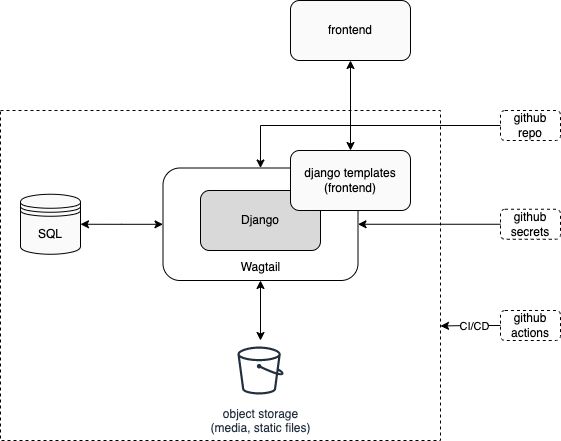Wagtail Web Deployment
04 Apr 2022System overview
- wagtail/django (settings files, static root/dirs)
- db
- object storage

Dev deployment
- set
DJANGO_SETTINGS_MODULE=settings.dev
database
- sqlite
DATABASES = {
'default': {
'ENGINE': 'django.db.backends.sqlite3',
'NAME': os.path.join(BASE_DIR, 'db.sqlite3'),
}
}
static storage
- local storage
# settings/dev.py
# where user's static file will be stored
STATICFILES_DIRS = [
os.path.join(PROJECT_DIR, 'static'),
]
# where collectstatic command output will be stored
STATIC_ROOT = os.path.join(BASE_DIR, 'static')
# relative URL to access static files, ie: http://domain.com/static/app.css
STATIC_URL = '/static/'
media storage
- the same as
static
dev tools
Staging deployment
- set
DJANGO_SETTINGS_MODULE=settings.staging
CI/CD pipeline
- versioning source code by github
- triggered
github actionson every push tomain,feat/*,dev/*branch and manually dispatch - using github secrets to store secret keys for deployment
- example for github action workflow:
name: CI/CD
on:
push:
branches: [ main, feat/* ]
pull_request:
branches: [ main ]
workflow_dispatch:
jobs:
deploy:
runs-on: ubuntu-20.04
strategy:
max-parallel: 4
matrix:
python-version: [3.9]
steps:
- name: Checkout repo
uses: actions/checkout@v2
- name: Set up Python $
uses: actions/setup-python@v3
with:
python-version: $
- name: Install Dependencies
run: |
python -m pip install --upgrade pip pipenv
pipenv install --system --dev --ignore-pipfile
- name: Run Tests
run: |
python manage.py test
- name: Deploy
uses: akhileshns/heroku-deploy@v3.12.12 # This is the action
with:
heroku_api_key: $
...
env:
HD_DJANGO_SETTINGS_MODULE: "app.settings.staging" # env prefix is HD_ to be recognized by heroku deploy service
...
- name: Slack Notification
if: always()
uses: rtCamp/action-slack-notify@v2
env:
SLACK_WEBHOOK: $
...
hosting
- heroku (using github actions
akhileshns/heroku-deploy@v3.12.12as above to deploy, free pricing plan -dynotype) - gunicorn (wsgi application)
# ./Procfile
web: gunicorn app.wsgi
release: python manage.py migrate
- collect static (this step is auto-executed by heroku). It will collect al static file (both
user's and djangostatic) intoSTATIC_ROOTdir
$ python manage.py collectstatic --noinput
database
- heroku postgresql (free pricing plan)
- using github secrets to setup db credentials for deployment
object storage (media, static files)
- cloudinary (media)
# settings/staging.py
INSTALLED_APPS += [
'django.contrib.staticfiles',
'cloudinary_storage',
'cloudinary',
]
CLOUDINARY_STORAGE = {
'CLOUD_NAME': os.environ.get("CLOUDINARY_NAME", "foo"),
'API_KEY': os.environ.get("CLOUDINARY_API_KEY", "foo"),
'API_SECRET': os.environ.get("CLOUDINARY_API_SECRET", "foo"),
'STATICFILES_MANIFEST_ROOT': os.path.join(BASE_DIR, "static")
}
DEFAULT_FILE_STORAGE = 'cloudinary_storage.storage.MediaCloudinaryStorage'
- whitenoise (static files)
# settings/staging.py
MIDDLEWARE += [
"whitenoise.middleware.WhiteNoiseMiddleware",
]
STATICFILES_STORAGE = "whitenoise.storage.CompressedManifestStaticFilesStorage"
other settings
# settings/staging.py
ALLOWED_HOSTS = ["domain.com"]
# or easier
ALLOWED_HOSTS = ["*"]